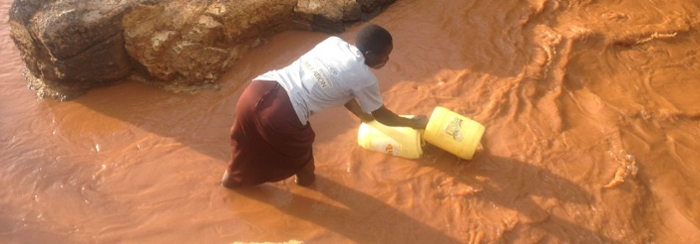Food or Water?
Dilemma leads Sera Young to create first cross-culturally validated household-level water insecurity scale
Get all our news

A woman collects water as part of a "go-along" interview near Rongo, Kenya. IPR anthropologist Sera Young is using interviews and other techniques to discover how water insecurity affects lives at the household level.
While in Kenya studying food insecurity during the first 1,000 days of life—or roughly the time between conception and a child’s second birthday—IPR anthropologist Sera Young stumbled upon an equally severe problem facing new mothers and their children: access to water.
At the start of her project, Young had set out to track food insecurity among 360 women of mixed HIV status and their infants—59 percent of whom experienced moderate or severe food insecurity. To better understand their experiences, Young and her colleagues gave participants cameras and asked them to take photos of factors that influenced their food availability. In addition to snapshots of food, the women came back with something the researchers were not expecting to see: water.
“As it turns out, water was very much on people’s minds,” Young said in a recent IPR colloquium, as she pointed to a photo of a locked-up water cistern taken by a woman who lived next to it. However, the woman had to spend time and money getting water elsewhere.
Another woman explained the dilemma of being torn between buying water or buying food.
“This makes the baby suffer because the money that ought to be used to buy her food ends up being spent on water,” Young recalled the woman telling her. “On the other hand, when the food is bought, that means that there is no water for cooking.”
Given these personal narratives, Young sought to include a water insecurity scale into the quantitative portion of her study, similar to the one she had already used to measure food insecurity. Surprisingly, she could not find an appropriate one. So, she decided to develop one.
Household Water Insecurity Experiences Scale (HWISE)
workshop held in August 2017 at Northwestern.
To do so, Young brought together a consortium of interdisciplinary researchers, practitioners, and on-the-ground collaborators from more than 24 sites globally. Over the course of two years, she and her colleagues have been working to finalize what will be the first cross-culturally validated household water-insecurity scale. Its questions cover various aspects of water use, including how frequently anyone in a household has had to drink unsafe water or gone to sleep thirsty in the last month.
Current estimates suggest that that more than 4 billion people experience water insecurity around the world for at least one month each year. Given the diversity of cultures, geography, and situations, Young discussed the necessity of creating a scale that can capture these wide range of experiences while still producing results that can be meaningfully compared across contexts.
The consortium, therefore, is working to refine a cross-culturally appropriate scale. With funding from several Northwestern University institutes and programs, including IPR, she hosted the consortium’s second workshop at the University’s Evanston campus from August 9–11. Researchers from 17 universities and six countries discussed how to improve ongoing data collection and methods for reducing the number of scale questions.
Since the workshop, the researchers have added new study sites in India, Samoa, Guatemala, and Bangladesh, bringing the total to 24. They also completed data collection for more than 3,800 participants across 16 sites, including in Ghana, Tajikistan, and Nepal.
“A validated scale is really just the beginning—it will launch a whole new area of public health and policy inquiry,” Young said.
Sera Young is assistant professor of anthropology and an IPR fellow. The HWISE 2017 workshop was supported by IPR, the Buffett Institute for Global Studies, and the Center for Water Research. For more information, visit the Household Water Insecurity Experiences Scale (HWISE) website.
Funding for HWISE comes from Innovative Methods and Metrics for Agriculture and Nutrition Actions, UK Aid, the National Institutes of Health, Family AIDS Care & Education Services, and the Wenner-Gren Foundation.
Top photo: Shalean Collins
Published: January 30, 2018.


